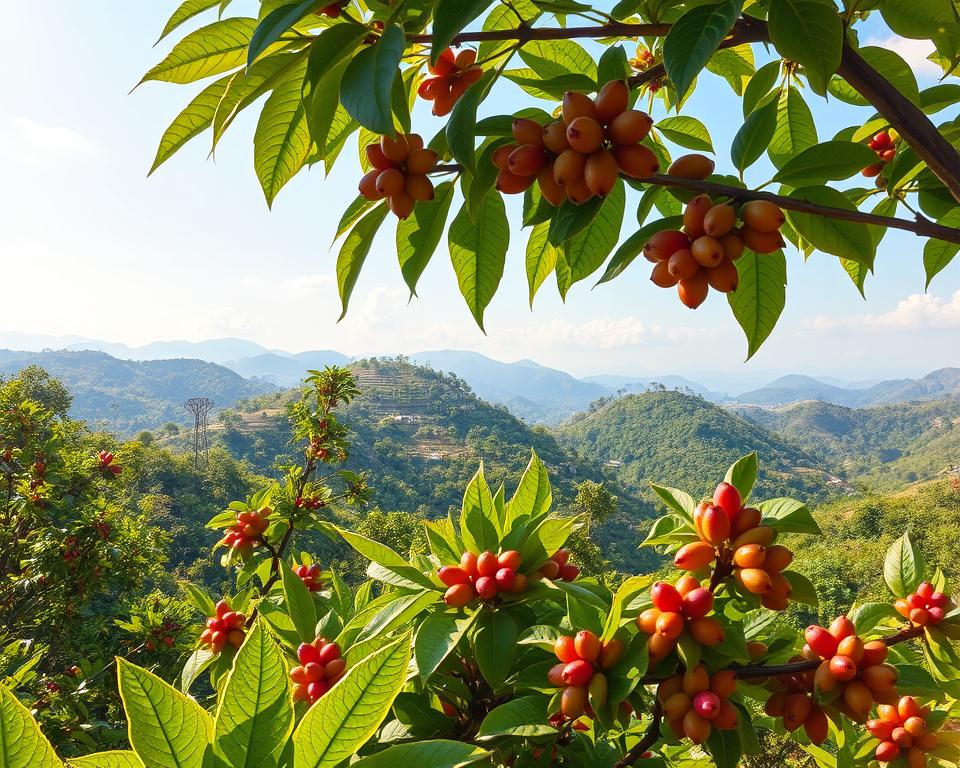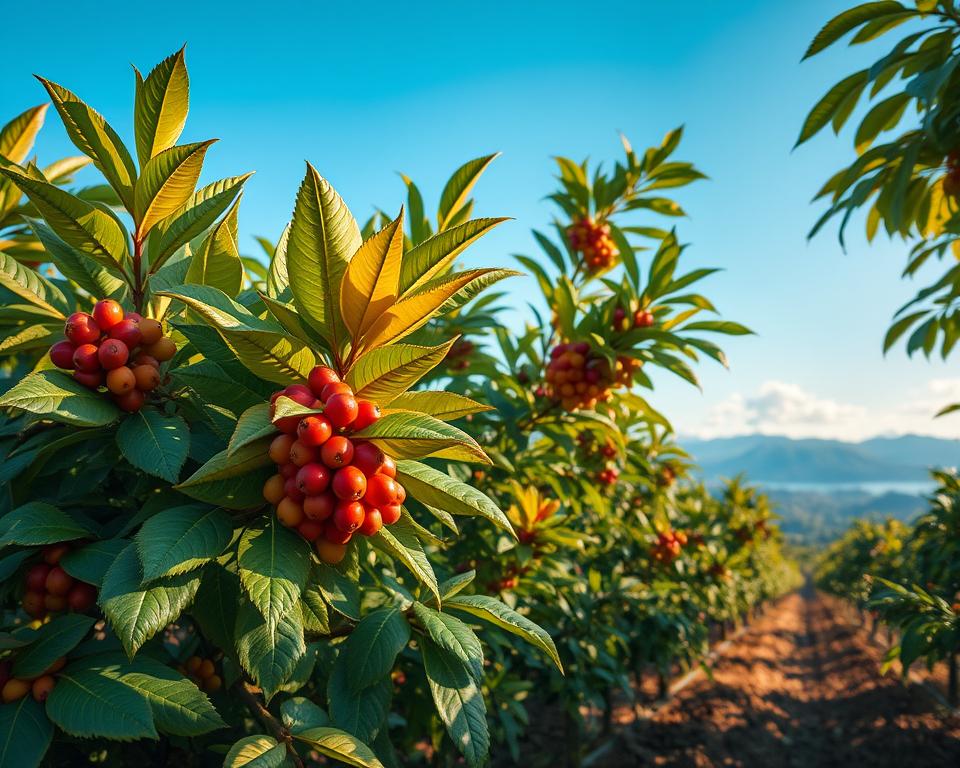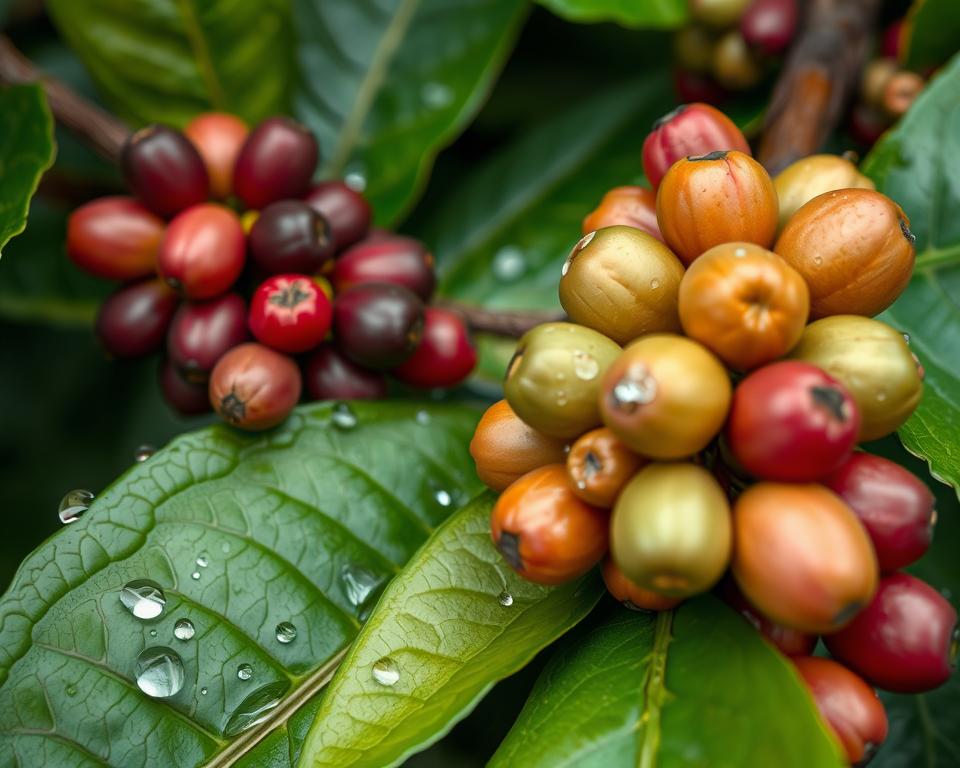Hybrid coffee varieties might sound complex, but they are pretty straightforward. Think of apples, like Honeycrisp and Gala. Each has unique tastes and qualities. Hybrid coffee beans are similar, offering special traits that make them stand out in the coffee world.
“Variety” means a coffee’s unique genes within a species, like Coffea arabica. But hybrids are more than just varieties. They lead agricultural innovation, aiming for better disease resistance, more yield, and better taste. This comes from both natural changes and careful breeding.
The Specialty Coffee Association (SCA) sees specialty coffee as any coffee that scores 80 or above out of 100. Hybrid varieties, like those grown in Colombia, can reach or even pass these standards. Their genetic diversity boosts both their strength and taste. This changes what’s possible in coffee making.
Introduction to Coffee Varieties
Exploring coffee varieties is like entering a vast maze. Just like apples have different kinds, coffee does too, especially Coffea arabica. This coffee species grows best between 600 to 2000 meters high. It likes cooler weather, between 15 to 24°C.

What is a Coffee Variety?
A coffee variety is a unique branch in the coffee family tree. It shows different genetic lines within one coffee species. Ethiopian landraces and many cultivated types make up over 10,000 Arabica varieties. Varieties like Bourbon and Typica are known for distinct flavors and qualities.
Difference Between Variety, Varietal, and Cultivar
Even coffee experts can get confused about “variety,” “varietal,” and “cultivar.” A “variety” is a natural branch of the coffee family. “Varietal” points to the traits of a variety. Meanwhile, “cultivar” is a variety made through human effort. Interesting fact: Arabica has a diploid chromosome set (44), while Robusta and Liberica have a haploid set (22).
Popular Arabica Varieties
Some Arabica coffee varieties stand out for their exceptional qualities. These include Bourbon, Typica, and Caturra. Bourbons come in types like Red, Yellow, and Pink, offering unique tastes. Typica is praised for its balanced flavor. Caturra, a Bourbon mutation, grows faster, which benefits places needing quick crops.
Understanding the genetics behind coffee helps in appreciating its variety. With climate change and high demand, knowing about these is more important than ever. Hybrids like Catimor and Ruiru 11 were created to be rust-resistant and high-yielding. This is key to coffee farming’s future.
Importance of Hybrid Coffee Varieties
Hybrid coffee varieties are crucial for the coffee industry’s future. They help tackle diseases and climate change effects. These varieties combine the best traits of Arabica and Robusta. This makes them stronger against tough conditions that beat traditional types.

One major advantage is their resistance to diseases. These plants can fight off things like rust leaf better. This keeps coffee production more consistent for farmers. It’s a big leap towards smarter farming, focusing on both plant health and high yields.
Hybrid plants are also known for their high productivity. For example, farmers using hybrids from the Tanzania Coffee Research Institute (TaCRI) see up to 5,000kg per acre. This high yield shows how hybrid coffee supports sustainability in the industry.
Developing these hybrids involves cutting-edge techniques like clonal propagation and tissue culture. This highlights growth in agriculture aimed at solving worldwide issues. By using these modern methods, hybrid coffee plants are set to prosper in our challenging agricultural world.
Hybrids mix strength and quality, bettering coffee tastes and guaranteeing future supply. As these varieties keep evolving, they’re poised to majorly impact global coffee production. They symbolize hope for ongoing improvements and survival in the coffee sector.
How Hybrid Coffee Varieties Are Developed
Creating hybrid coffee varieties mixes art with science. This complex process helps keep our coffee high quality, despite agricultural hurdles. It combines natural actions and human help.
Natural Process vs. Human Intervention
Coffee plants change over time through mutation and crossbreeding. This leads to the traits we like in coffee. But, farmers and scientists don’t just wait for nature to act. They improve traits like disease resistance and productivity using coffee breeding techniques.
Selecting Desirable Traits
Selecting traits means picking the best from various coffee plants. We look for good flavor, pest resistance, and high yields. For instance, Geisha coffee is loved for its taste, while Sarchimor fights disease well. This focus helps improve coffee genetically.
Breeding Programs and Techniques
Breeding programs and techniques are key for hybrids. For example, somatic embryogenesis helps in plant reproduction. In 2022, World Coffee Research picked four F1 hybrid candidates from Geisha and Sarchimor for trials. Companies like Counter Culture Coffee and Starbucks’ Alsacia Farm are testing these plants in places like Costa Rica.
In the next six years, these hybrids will be checked for disease resistance and quality in different climates. WCR plans to introduce 100 new Arabica varieties by 2030. They’re also starting a robusta breeding network for future climate challenges.
This detailed method makes sure we develop precise, sustainable hybrid coffee varieties. This matches increasing global demand and the need for environmental care in coffee farming.
Are Rare Coffee Bean Varieties Considered Hybrid Coffee Varieties?
Rare coffee discoveries often captivate enthusiasts, leading them to explore the complex world of coffee genetics. While some think that hybrid coffee varieties are rooted in these unique beans, hybrids typically involve crossbreeding different species. In contrast, rare varieties can arise through natural mutations, enriching the diverse coffee landscape.
Benefits of Hybrid Coffee Varieties
Hybrid coffee varieties are leading the way with their big benefits. They support agricultural innovation and promote sustainable coffee farming. Hybrids are created to overcome climate change and diseases. Thus, they help keep coffee quality high and improve farmers’ lives.
Improved Disease Resistance
Hybrid coffee plants are better at fighting diseases. Traditional coffee plants can fall victim to diseases like coffee leaf rust. These diseases can destroy entire crops. But, hybrids are tougher. For instance, the Central Coffee Research Institute (CCRI) in India has developed hybrids like SLN 9 and Chandragiri. These hybrids help farmers by reducing crop failures and the economic impact of diseases.
Higher Yields
Hybrids also produce more coffee. This is important for the 25 million smallholder farmers who grow most of the world’s coffee. More coffee means more money and stability for these farmers. World Coffee Research (WCR) has found that certain hybrids can produce lots of coffee under real farm conditions.
Enhanced Flavor Profiles
Hybrids don’t sacrifice taste for these benefits. Some have been developed to improve coffee’s flavor. For example, the famous Geisha variety keeps its unique taste when hybridized. Other hybrids, like Pacamara from El Salvador, are known for their rich flavors. They have fruity, floral, and nutty notes that make them a hit in the specialty coffee world.
In the end, hybrid coffee varieties offer a bright future for coffee farming. They combine agricultural innovation with the needs of a changing world. And they do this without losing the quality of coffee we all love. To explore more about coffee effects, like how decaf affects sleep, click this informative article.
FAQ
What are hybrid coffee beans?
Hybrid coffee beans come from the mix of different coffee types. They blend strong traits from Robusta with Arabica’s complex flavors. This offers better disease resistance, more coffee beans, and improved tastes.
What is a coffee variety?
Coffee varieties are specific kinds within the Coffea arabica species. They’re like apple types, each with unique tastes and features.
What is the difference between variety, varietal, and cultivar?
“Variety” means a natural type in the coffee world. “Varietal” relates to the unique traits of a variety. “Cultivar” stands for a variety made by people, created for special qualities.
What are some popular Arabica varieties?
Famous Arabica types are Bourbon, Typica, and Caturra. They’re known for special flavors, much like how different apples have their own tastes.
Why are hybrid coffee varieties important?
Hybrid coffees are key for keeping coffee going strong. They fight off diseases, produce more beans, and handle climate change well. This helps coffee farmers stay in business and keeps coffee quality high.
How are hybrid coffee varieties developed?
Making hybrid coffees combines natural steps and science. This mix aims to bring out good flavors, disease fighting, and more beans. Breeders select the best traits carefully.
What is the natural process vs. human intervention in coffee breeding?
Natural processes let coffee change on its own. Human intervention, however, aims to improve specifics like taste, healthiness, or bean amounts.
How are desirable traits selected in hybrid coffee breeding?
Selecting traits involves testing out different coffee plants. Breeders aim for great flavors, toughness, and more beans. Tools like cross-pollination help in this.
What are some breeding programs and techniques used in hybrid coffee development?
Techniques for making better hybrid coffees include cross-pollination and tissue culture. Groups like World Coffee Research help by combining the best traits from different coffees.
How do hybrid coffee varieties improve disease resistance?
Hybrids get tough traits from Robusta coffee. This helps them fight off problems like rust leaf. Hence, they’re less likely to fail, helping farmers.
How do hybrid coffee varieties ensure higher yields?
Hybrids grow strong and use land well. This leads to more coffee and helps farmers make more money.
Can hybrid coffee varieties have enhanced flavor profiles?
Yes, hybrids can taste even better. For example, crossing with high-end Arabica like Geisha can keep or boost their unique flavors. This pleases coffee lovers everywhere.




